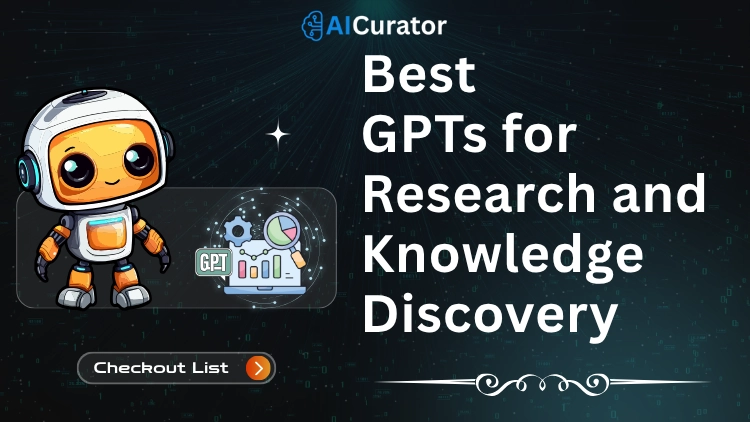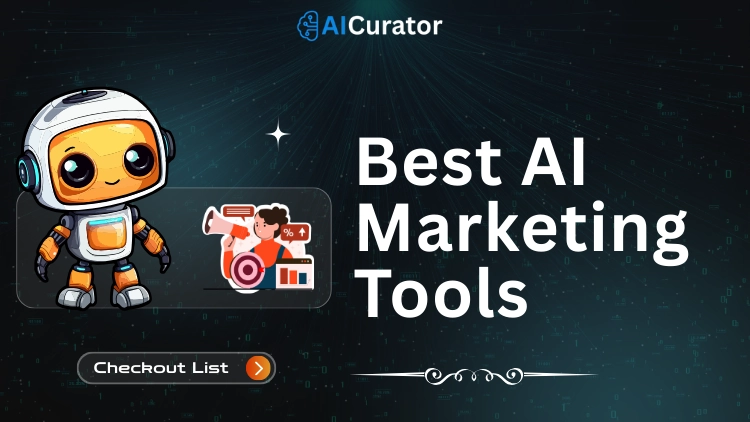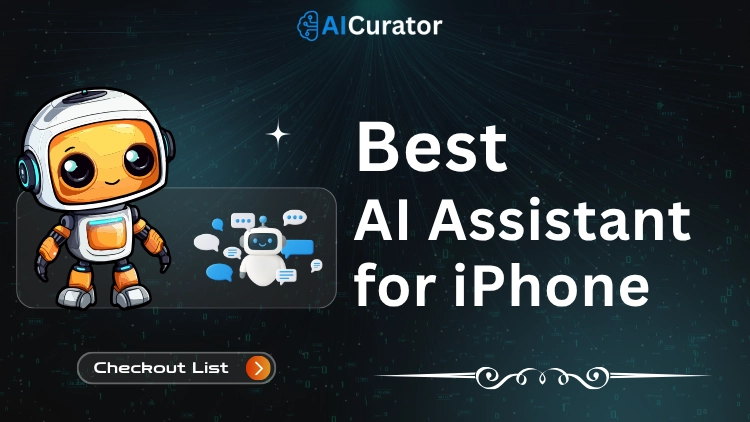Stop wasting hours digging through endless search results when custom GPTs for research and knowledge discovery can do the heavy lifting for you.
Academic professionals and researchers are already using these specialized AI research assistants to extract insights from complex datasets, analyze scholarly papers, and generate comprehensive reports in minutes.
These aren't your basic ChatGPT conversations – we're talking about purpose-built research GPTs that understand scientific methodology, citation formats, and data interpretation.
Ready to see which knowledge discovery tools made our top picks?
Why Smart Researchers Choose GPTs for Research and Knowledge Discovery
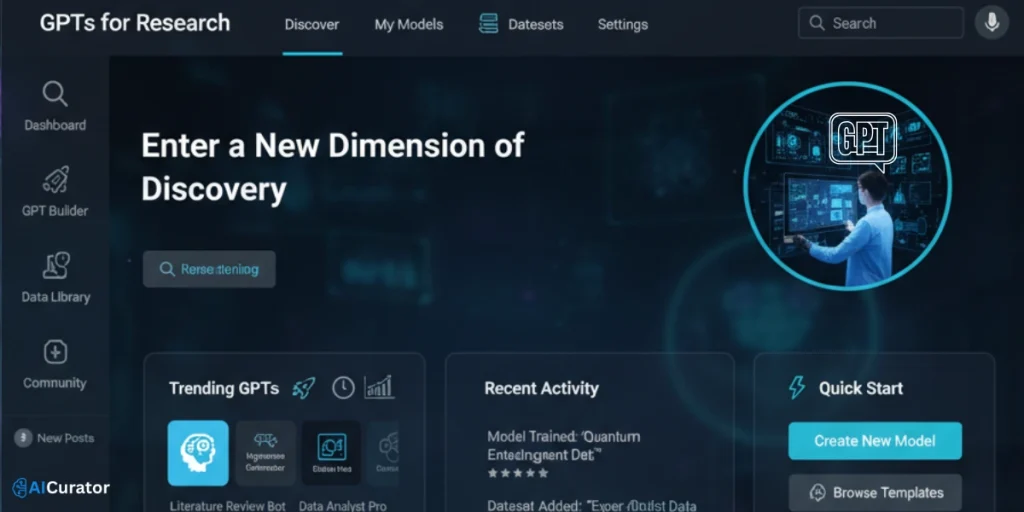
Generative Pre-trained Transformer (GPT) models are transforming research and knowledge discovery by dramatically enhancing the efficiency and scope of information analysis. These advanced AI tools equip researchers to process vast datasets, identify complex patterns, and uncover insights that might otherwise be missed.
By automating laborious tasks like literature reviews and data synthesis, GPTs accelerate the research lifecycle from hypothesis generation to manuscript preparation. The core of this revolution lies in their ability to understand and generate human-like language, allowing for a more intuitive and conversational interaction with complex information.
Instead of rigid keyword searches, researchers can use natural language to explore topics, summarise extensive scientific literature, and identify emerging trends or gaps in existing knowledge. This capability not only saves significant time but also fosters creative problem-solving and encourages interdisciplinary collaboration by providing diverse perspectives and making complex topics more accessible.
By organising and retrieving information more effectively, these models help transform enormous volumes of data into structured, actionable knowledge.
GPTs Every Researcher Should Know for Knowledge Discovery
| GPTs for Research | Core Functionality | Primary Use Case |
|---|---|---|
| Scholar GPT | Academic Paper Search | Rapid Literature Discovery |
| AskYourPDF | PDF Interaction | Extracting PDF Data |
| Research Assistant | Agentic Web Search | Comprehensive Reports |
| Deep Research | In-depth Investigations | High-Stakes Analysis |
| Paper Reviewer | Manuscript Analysis | Pre-Submission Feedback |
| SciSpace | Unified Research Hub | Streamlining Workflows |
| Data Analyst | Dataset Interpretation | Actionable Insights |
1. Scholar GPT
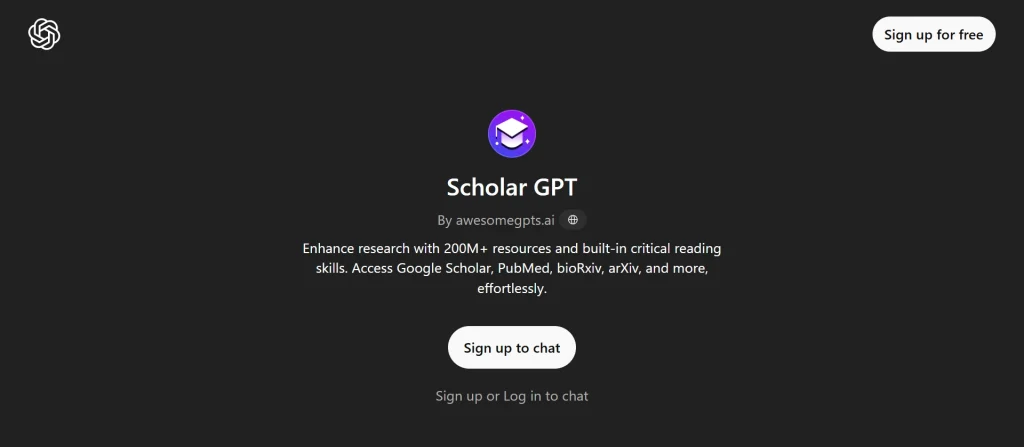
Scholar GPT is an exceptional AI research assistant for academics who need to quickly search and synthesize scientific literature. This GPTs for research excels at finding relevant papers from reliable sources like Google Scholar, PubMed, and arXiv, providing a strong foundation for any study.
It is engineered for in-depth knowledge discovery, allowing users to get summarized abstracts and detailed analyses of research methodologies. This tool helps researchers efficiently navigate complex academic databases, saving valuable time during the literature review phase.
Scholar GPT Key Features
Best for:
Streamlining literature reviews and academic paper discovery.
- Rating: ★★★★☆ (4.5/5)
2. AskYourPDF Research Assistant
AskYourPDF Research Assistant is an essential GPTs for research that turns your static documents into interactive knowledge bases. This AI research assistant allows you to “chat” directly with your PDFs, making it exceptionally easy to extract key information, find data points, and get summarized answers without manual reading.
This tool is a powerful asset for any knowledge discovery workflow. By enabling direct interaction with single or multiple documents at once, it enhances research efficiency for students and professionals, ensuring you can quickly locate and verify information for your academic or industry projects.
AskYourPDF Research Assistant Key Features
Best for:
Extracting insights and data from existing PDF documents.
- Rating: ★★★★☆ (4.6/5)
3. Research Assistant
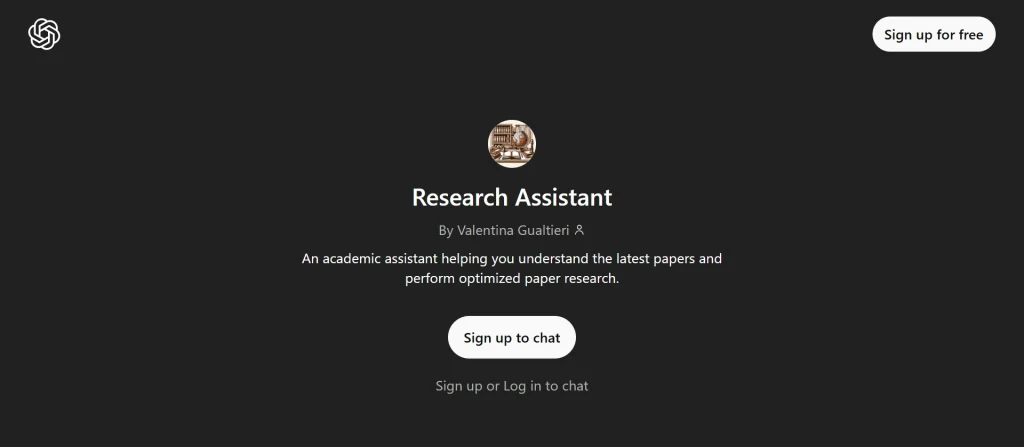
Research Assistant is a powerful GPTs for research designed for comprehensive, multi-step investigation. This AI research assistant autonomously explores complex topics across the internet, then synthesizes its findings into a detailed, well-organized report, complete with citations.
This approach to knowledge discovery is ideal for users who need to go beyond simple searches and perform deep analysis. It excels at tackling complex research questions, making it a valuable tool for academics, analysts, and professionals who require thorough and evidence-based insights for their work.
Research Assistant Key Features
Best for:
Complex research, multi-source synthesis, and academic reports.
- Rating: ★★★★☆ (4.6/5)
4. Deep Research
Deep Research is an advanced GPTs for research, engineered to function as an agentic AI research assistant for complex investigations. It independently navigates the web to gather, analyze, and synthesize information from numerous sources, delivering a fully documented report.
This tool elevates knowledge discovery by tackling multifaceted topics that require extensive exploration. It is specifically designed for professionals in finance, science, and policy who need thorough, precise, and verifiable research outputs for high-stakes decisions, transforming hours of work into minutes.
Deep Research Key Features
Best for:
High-stakes analysis, in-depth academic studies, and policy research.
- Rating: ★★★★☆ (4.7/5)
5. Scientific Paper Reviewer
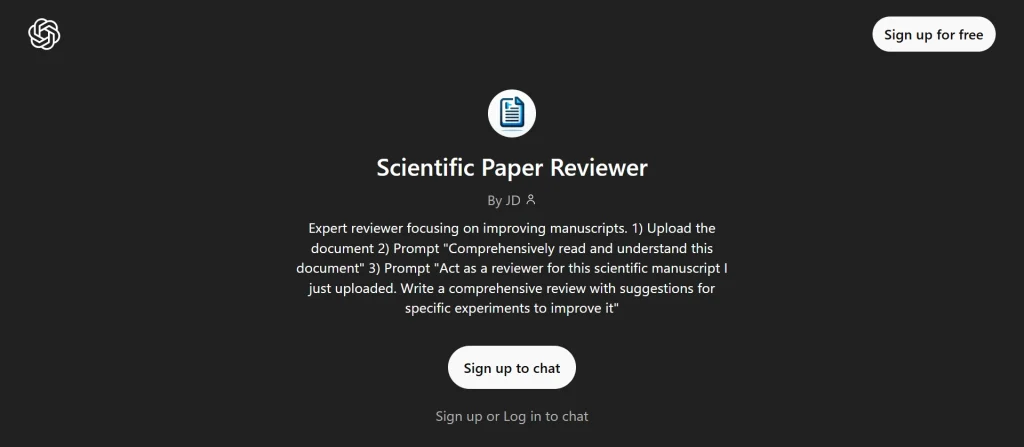
Scientific Paper Reviewer is a specialized GPTs for research that acts as a pre-submission peer reviewer. It offers detailed, human-like feedback on scientific manuscripts by evaluating the core sections—from the abstract and introduction to the methods and discussion—helping you refine your paper for publication.
This AI research assistant enhances your knowledge discovery process by identifying potential weaknesses and areas for improvement before formal review. It compares your work against the standards of high-impact research, ensuring clarity, coherence, and structural integrity, which is invaluable for researchers aiming to publish in top-tier journals.
Scientific Paper Reviewer Key Features
Best for:
Polishing manuscripts and preparing for the peer review process.
- Rating: ★★★★☆ (4.4/5)
6. SciSpace
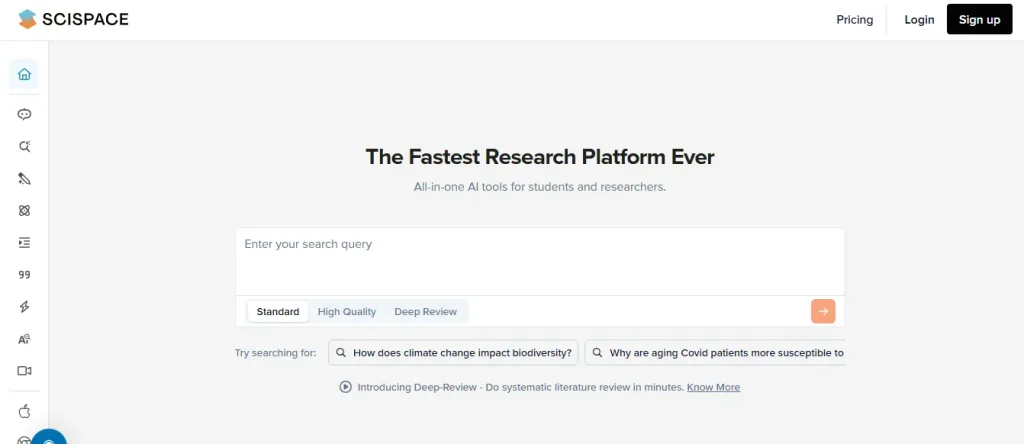
SciSpace is an all-in-one AI research assistant that streamlines the entire academic research workflow. It leverages semantic search to help you navigate over 280 million papers, moving beyond simple keyword queries to understand the true intent of your research questions.
As a comprehensive GPTs for research, it simplifies complex information with its Copilot feature, which allows you to interactively chat with any research paper for explanations and summaries. This makes it an invaluable tool for both students and expert researchers looking to accelerate their knowledge discovery process.
SciSpace Key Features
Best for:
Streamlining literature reviews and enhancing paper comprehension.
- Rating: ★★★★☆ (4.5/5)
7. Data Analyst

Data Analyst is a powerful GPTs for research that excels at turning complex data into clear, actionable insights. This AI research assistant can process and analyze large datasets from various file types, including CSVs and spreadsheets, to identify key trends and statistical summaries.
It is engineered for deep knowledge discovery within structured data. The tool writes and executes Python code to perform tasks like merging datasets, creating pivot tables, and generating interactive visualizations, making sophisticated data analysis accessible to both experts and beginners.
Data Analyst Key Features
Best for:
In-depth data analysis, interactive visualizations, and business intelligence.
- Rating: ★★★★☆ (4.6/5)
How to Maximize Your Research Output with Knowledge Discovery GPTs?
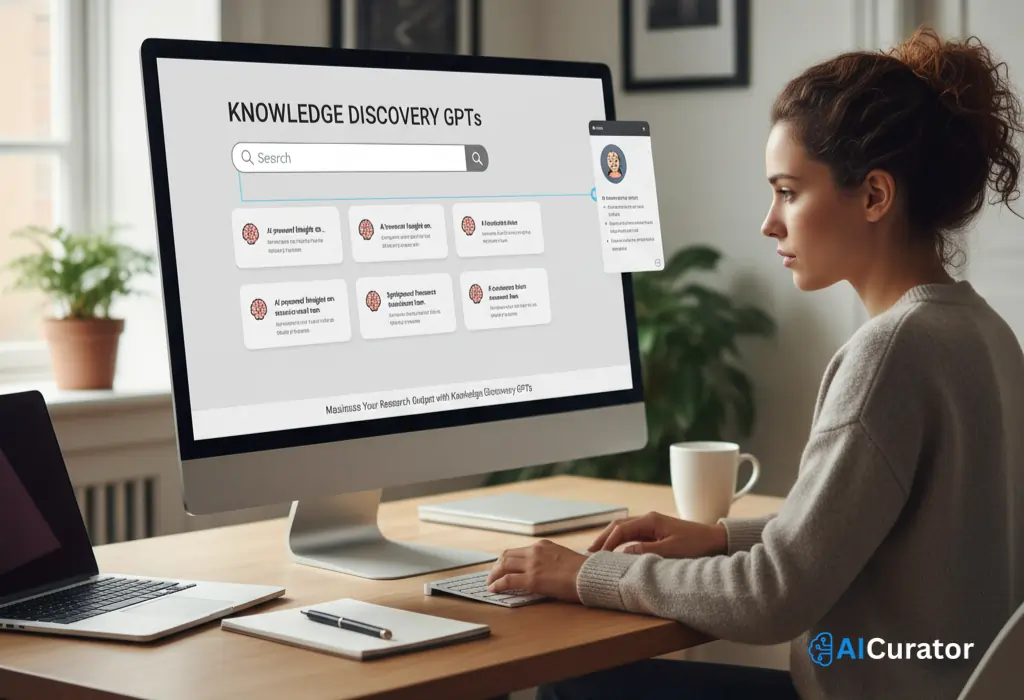
To maximize research output with knowledge discovery GPTs, it is essential to adopt a strategic approach that leverages their strengths while mitigating their limitations.
The most critical skill is effective prompt engineering, which involves crafting clear, specific, and context-aware instructions to guide the AI toward the desired outcome. Providing sufficient background and defining the scope of the task precisely will yield more accurate and relevant results.
Furthermore, these AI models should be viewed as a complementary tool to augment, not replace, human expertise. Researchers must critically evaluate all outputs for accuracy, bias, and relevance. Verifying key facts and cross-referencing information with primary sources remains a crucial responsibility for maintaining research integrity.
Finally, integrating these tools into a broader research workflow that includes traditional methods and software can lead to more comprehensive insights. Understanding the inherent limitations of the technology, such as potential inaccuracies or an inability to access the very latest information, is key to using it responsibly and effectively.
This balanced approach ensures that you harness the power of AI to accelerate discovery while upholding rigorous academic and scientific standards.
The Impact of AI on Knowledge Discovery

The best GPTs for research simplify how academics and professionals approach knowledge discovery. By automating literature reviews, data analysis, and citation management, these AI research assistant tools significantly reduce manual work.
This allows you to focus on critical thinking and generating new insights. While each platform has unique strengths, they all share a common goal: to accelerate your research workflow. For any serious researcher, adopting the right AI tool is a direct path to greater efficiency and productivity.
Recommended Readings:







